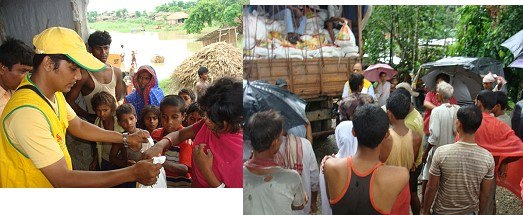|
Love in Action |
| India |
By India Relief Team (Originally in English)

Days of incessant rainfall signaling the arrival of the 2011 monsoon season caused severe flooding and landslides in Nepal and parts of India, claiming at least 20 lives and affecting hundreds of thousands of people. In India, the states of Bihar and Assam were devastated, as swollen rivers overflowed their banks, submerging villages and farmland.
Sending all Her love and prayers to the region, Supreme Master Ching Hai asked our local Association members to offer support to those affected and contributed US$25,000 to meet their emergency needs.
Darbhanga, Bihar
On July 17, 2011, our Association’s India relief team flew to Bihar’s capital, Patna, and then traveled by car to the Darbhanga District. After speaking with local practitioners, the team bought enough clothing, staple food items and snacks to fill 1,100 aid packages.
The team then traveled by road and boat to the District’s Kusheshwar Asthan Block, where more than 3,000 families were affected. The relief packages were distributed to the most severely impacted households and elderly residents, while the children received school bags and stationery. Master’s generosity and concern for the flood-affected people in such remote parts of India attracted much attention from the local media, such as the Patna edition of the Rashtriya Sahara newspaper.
North Lakhimpur, Assam
On August 3, the relief team arrived in Guwahati, Assam’s largest city, and began buying relief supplies. Early the next morning, another 1,100 packages of emergency provisions, prepared overnight, were loaded onto a truck and the team travelled to North Lakhimpur, where they were met by Deputy Commissioner Dr. Anwaruddin Choudhury, whose office assisted the team in distributing the emergency packages to people in shelters and remote villages.
Hopefully, through Supreme Master Ching Hai’s unconditional
love and heartfelt support, the distress of the flood-affected
people will be eased and such extreme weather events will soon
be averted through humanity’s greater care for the environment.
![]()
Description |
Amount
(INR) |
Receipt |
Food (beaten rice, roasted gram, biscuits, sweets), ladies’ cloths, saris, dhotis, petticoats, towels, etc. |
981,646 |
A |
Miscellaneous expenses (car rental, airline fare, hotel fees, hall rental, food, labor and bags) |
143,476 |
B |
Total
|
1,125,122 |

| << | Contents | >> |
|
Refer this page to friends
|
||